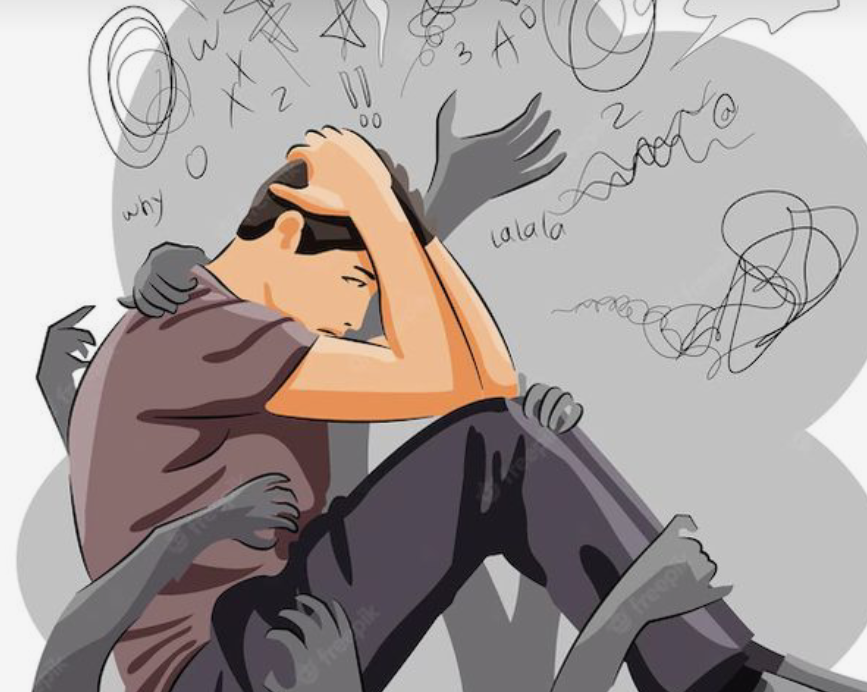
Depression IS One of the most dangerous things human suffers
Depression is a mental health disorder characterized by persistent feelings of sadness, hopelessness, and a lack of interest in activities. It can affect how a person thinks, feels, and handles daily activities. Some common features of depression include:
1. Persistent Sadness
A deep and prolonged feeling of sadness or emptiness that persists for most of the day
2. oss of Interest or Pleasure
Diminished interest or pleasure in activities that were once enjoyable
3. Changes in Sleep Patterns
Insomnia or excessive sleeping can be symptoms of depression.
4. Fatigue
Feeling tired or lacking energy, even after rest
5. Changes in Appetite or Weight
Significant changes in appetite, leading to weight loss or gain.
6. Difficulty Concentratin
Trouble focusing, making decisions, or experiencing memory issues.
7. Feelings of Guilt or Worthlessness
Persistent feelings of guilt, worthlessness, or self-blame.
8.Physical Symptoms
Aches, pains, headaches, or digestive issues without a clear medical cause
9. Social Withdrawal
Avoidance of social activities, withdrawal from friends and family.It’s important to note that depression is a serious medical condition, and its causes can be complex, involving a combination of genetic, biological, environmental, and psychological factors. Seeking professional help from a mental health practitioner, such as a psychiatrist or psychologist, is crucial for accurate diagnosis and appropriate treatment. Treatment may include therapy, medication, lifestyle changes, or a combination of these approaches. If you or someone you know is experiencing symptoms of depression, it’s important to reach out for support.

A person lost himself in our body. feels evertime sad and depressed
Why I feel depressed
Feeling depressed can result from a combination of various factors, and it’s important to recognize that everyone’s experience is unique. Some common factors contributing to depression include:
1. Biological Factors
Imbalances in brain chemicals (neurotransmitters) such as serotonin and norepinephrine can play a role in mood regulation.
2. Genetic Factor
A family history of depression or other mental health disorders can increase the likelihood of experiencing depression.
3.Environmental Factors
Stressful life events, trauma, loss, or chronic stressors can trigger or contribute to depression.
4. Medical Conditions
Certain medical conditions or chronic illnesses may be linked to depressive symptoms.
5. Psychological Factors
Personality traits, low self-esteem, negative thought patterns, or unresolved emotional issues can contribute to depression
6.Hormonal Changes
Hormonal fluctuations, such as those occurring during puberty, pregnancy, or menopause, can impact mood
7. Substance Abuse
Substance abuse, including alcohol or drug misuse, can contribute to or exacerbate depressive symptoms.It’s important to recognize that seeking professional help is crucial for understanding the specific factors contributing to your feelings of depression and developing an appropriate treatment plan. Mental health professionals, such as psychologists, psychiatrists, or therapists, can provide support, guidance, and evidence-based treatments tailored to your individual needs. If you are experiencing persistent feelings of depression, consider reaching out to a mental health professional or a healthcare provider for assistance.

How I control depression
Managing depression often involves a combination of self-help strategies, professional support, and, in some cases, medical intervention. Here are some general strategies that may help in managing depression:
1. Seek Professional Help
Consult with a mental health professional, such as a psychologist, psychiatrist, or therapist. They can provide a diagnosis, therapy, and, if necessary, medication
2. Medication
If prescribed by a healthcare professional, antidepressant medications can help balance neurotransmitters in the brain. Always take medications as prescribed.
3. Therapy
Cognitive-behavioral therapy (CBT), psychotherapy, or other therapeutic approaches can help you understand and manage negative thought patterns and behaviors.
4. Build a Support System
Share your feelings with friends, family, or a support group. Having a strong support system is crucial for managing depression.
5. Healthy Lifestyle
Maintain a balanced diet, regular exercise, and sufficient sleep. These factors can significantly impact mood and overall well-being.
6. Set Realistic Goals
Break tasks into smaller, achievable goals. Celebrate small victories, and don’t overwhelm yourself with unrealistic expectations
7.Mindfulness and Relaxation Techniques
Practice mindfulness meditation, deep breathing exercises, or yoga to help manage stress and improve emotional well-being
8. Limit Alcohol and Substance Use
Avoid excessive alcohol or substance use, as they can exacerbate depressive symptoms
9. Engage in Activities You Enjoy
Find activities that bring you joy and a sense of accomplishment. Even small, enjoyable activities can have a positive impact.
10. Create a Routine
Establishing a daily routine can provide structure and stability, which can be particularly beneficial during periods of depression.It’s important to remember that managing depression is a process, and what works for one person may not work for another. If you or someone you know is struggling with depression, consider seeking professional help. A mental health professional can provide personalized guidance and support tailored to your specific situation.

Signs & symptoms
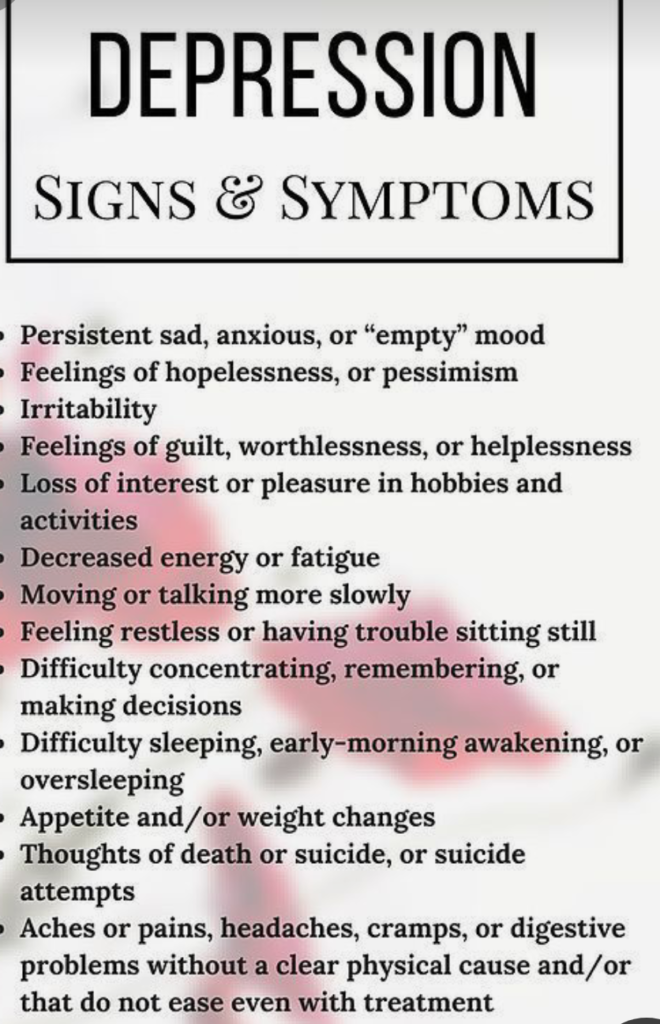
Reason of depression
Depression is a complex mental health condition with multiple contributing factors. It often results from a combination of biological, psychological, and environmental elements. Here are some common factors associated with the development of depression
1. Biological Factors
Brain Chemistry Imbalances in neurotransmitters, such as serotonin and norepinephrine, may contribute to depressive symptoms. – Genetics
A family history of depression or other mood disorders can increase an individual’s susceptibility.
2. Psychological Factors
Personality Certain personality traits, such as a tendency toward negative thinking, low self-esteem, or perfectionism, may play a role. Trauma and Stress
Traumatic life events, chronic stress, or prolonged exposure to stressors can contribute to depression
3.Environmental Factors
Early Childhood Experiences
Adverse experiences during childhood, such as abuse or neglect, can impact mental health later in life
Life Events
Major life changes, such as loss of a loved one, relationship difficulties, or financial struggles, can trigger depression.
4. Physical Health Conditions
Certain medical conditions, chronic illnesses, or hormonal changes (e.g., thyroid disorders) may be linked to depression.
5. Substance Abuse
Substance abuse, including alcohol or drug misuse, can contribute to or worsen depressive symptoms.
6.Medication Side Effects
Some medications, such as certain types of steroids or contraceptives, may have depressive side effects.It’s important to note that individuals may have different combinations of these factors contributing to their depression. Additionally, the experience of depression can vary widely among individuals. Seeking professional help from a mental health practitioner is crucial for accurate diagnosis and appropriate treatment tailored to the specific circumstances of each person.
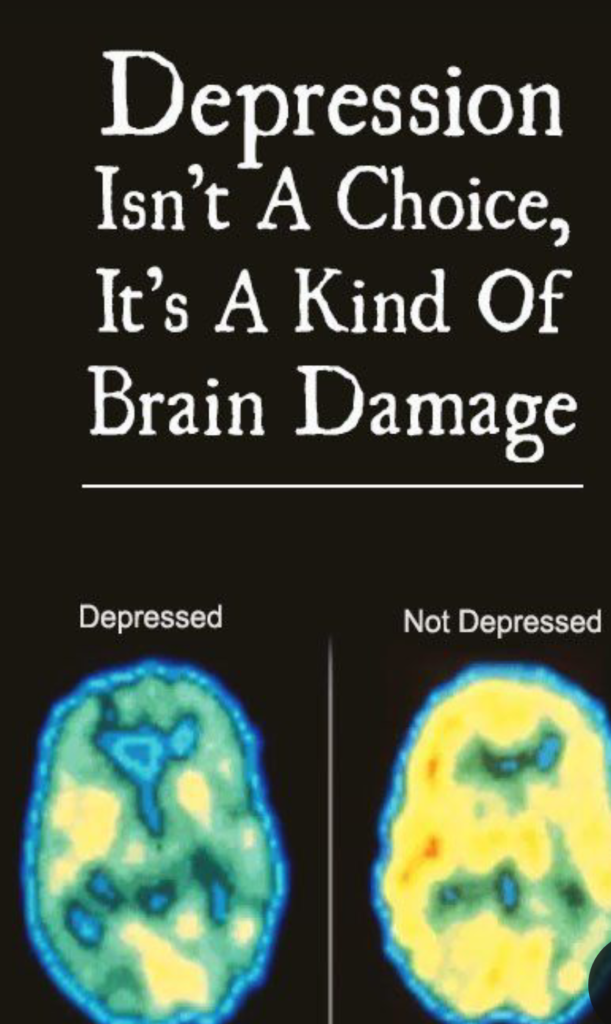
Help for depression
If you’re experiencing depression, reaching out for help is a crucial step toward managing and overcoming it. There are several individuals and resources that can offer support:
1.Mental Health Professionals
Therapists and Counselors Licensed therapists, psychologists, or counselors specialize in providing talk therapy. They can help you explore and address the underlying issues contributing to your depression.
Psychiatrists
Medical doctors who can prescribe medication for depression. They may also provide therapy or work in collaboration with a therapist.
2. General Practitioner (GP) or Family Doctor
Your primary care doctor can assess your symptoms, rule out any potential medical causes, and provide referrals to mental health specialists.
3.Crisis Helplines National Suicide Prevention Lifeline (US)
Call 1-800-273-TALK (1-800-273-8255) for confidential support. In Case of Emergency (Outside the US) Check local emergency numbers or helplines available in your country.
4. Supportive Friends and Family
Share your feelings with trusted friends or family members. Their understanding and support can be valuable
5. Support Groups
Joining a local or online support group allows you to connect with others who may be experiencing similar challenges.
6.Online Resources
Explore reputable mental health websites and forums for information, resources, and peer support.
7. Workplace Resources
Many workplaces offer Employee Assistance Programs (EAPs) that provide counseling and support services
8. Community Mental Health Centers
Local mental health clinics or community centers may offer affordable or sliding-scale services.Remember that seeking help is a sign of strength, and you don’t have to navigate depression alone. If you’re unsure where to start, consider talking to your primary care doctor, who can guide you to appropriate resources and support.
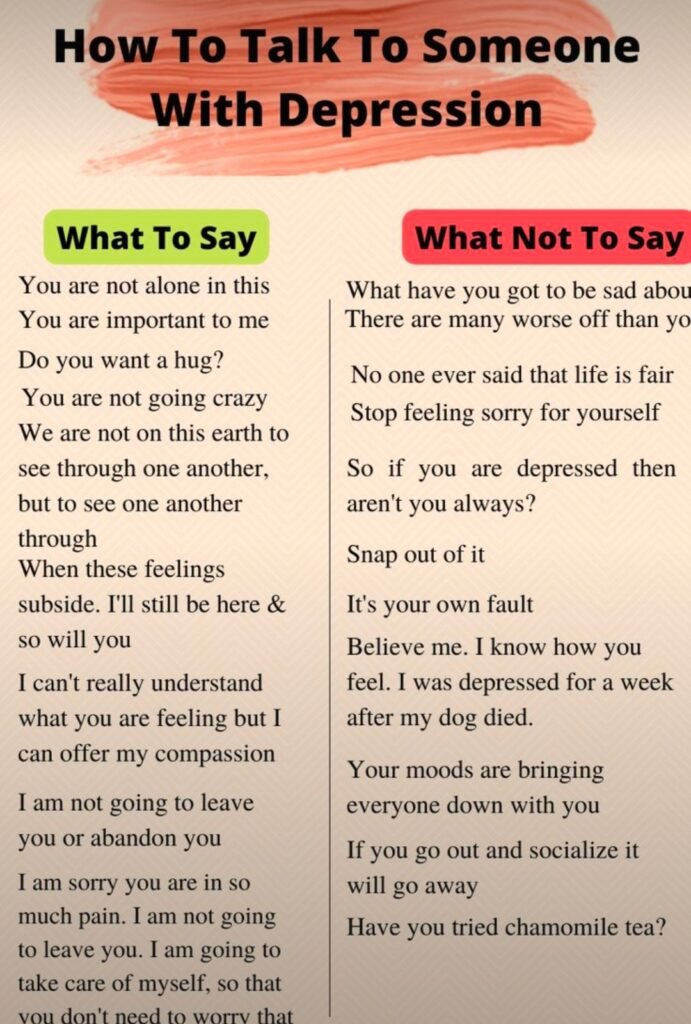
Quote for depression
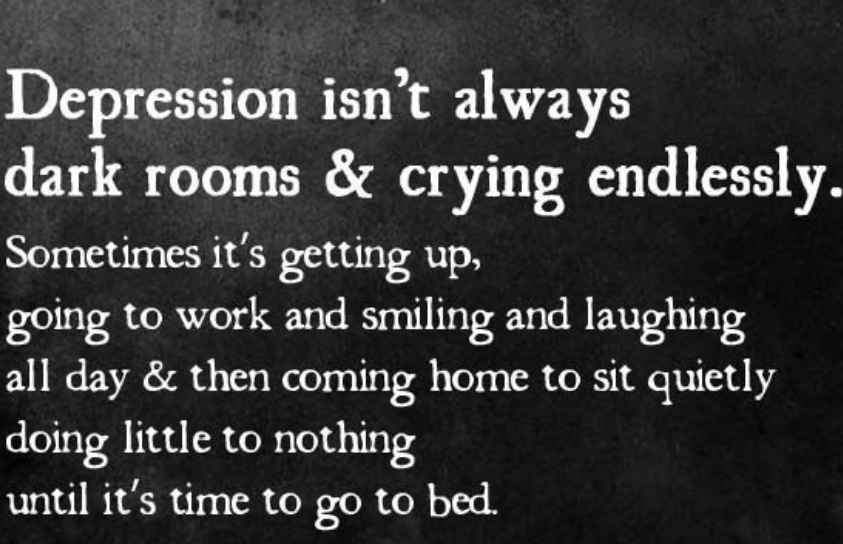

I am a content writer I have experience been writing news and blog articles for 5 years.